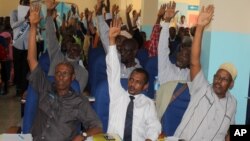NAIROBI, KENYA —
On Monday, Somali lawmakers voted Prime Minister Abdi Farah Shirdon out of office following weeks of disagreement with the president over a planned cabinet reshuffle. However, the change of prime minister won't necessarily end Somalia’s political wrangles.
As the Somali government marked its one-year anniversary in September, the international community was generally satisfied with the progress and stability of the government compared to its predecessors.
But some political observers said the government was not inclusive enough, and that some clans were shortchanged in the political appointments.
The problem between the president and prime minister reportedly started when they tried to negotiate how to reorganize the Cabinet.
The prime minister’s ouster was sealed in parliament Monday, when his critics accused his administration of favoritism and clan politics.
Emmanuel Kisiangani, a senior researcher with the Nairobi-based Institute for Security Studies, says Monday’s move shows parliament is doing its work by putting an end the political bickering between the two leaders.
“We’ve had a standoff between the president and the prime minister, and that this might be a culmination, a demonstration one that the Somali institutions particularly the parliament is working, and secondly possibly the standoff between the president and the prime minister is now water-under-a-shed,” Kisiangani said.
In a statement, the U.N. special representative of the secretary-general for Somalia, Nicholas Kay, said the country’s institutions have come of age and that the U.N. is looking forward to working closely with the next administration. Kay has also praised the outgoing prime minister for his dedication to promote growth and strong relationship with international partners.
But outgoing Prime Minister Shirdon has accused the parliamentarians of not giving him and his administration the chance to defend itself.
“The second day before the motion in the parliament, as prime minister of the country, I was not allowed to listen the allegations or defend myself," Shirdon said. "That’s really painful thing for me.”
As Somalia wrestles with political division, violence and corruption, Berlin-based corruption watchdog Transparency International said Tuesday that Somalia is the most corrupt country in the world.
Kisiangani agrees that Somalia has major problems and that there is no guarantee Shirdon's replacement will be safe.
“It depends, if say president appoints someone who does not have strong personality, then he might be amendable to what the president says," Kisiangani said. "If the president says pick so and so, gives him a list and say “I want this in government,” then that might happen. But if you have a strong person then we are likely to run into same same problem like the ones we had previously.”
Infighting has become the norm in Somali politics. In the past six years, Somalia has had five prime ministers, including Shirdon.
The ousted prime minister will remain in office until the president, Hassan Sheikh Mohamud, nominates a new prime minister. The new premier will then have a month to form an administration.
As the Somali government marked its one-year anniversary in September, the international community was generally satisfied with the progress and stability of the government compared to its predecessors.
But some political observers said the government was not inclusive enough, and that some clans were shortchanged in the political appointments.
The problem between the president and prime minister reportedly started when they tried to negotiate how to reorganize the Cabinet.
The prime minister’s ouster was sealed in parliament Monday, when his critics accused his administration of favoritism and clan politics.
Emmanuel Kisiangani, a senior researcher with the Nairobi-based Institute for Security Studies, says Monday’s move shows parliament is doing its work by putting an end the political bickering between the two leaders.
“We’ve had a standoff between the president and the prime minister, and that this might be a culmination, a demonstration one that the Somali institutions particularly the parliament is working, and secondly possibly the standoff between the president and the prime minister is now water-under-a-shed,” Kisiangani said.
In a statement, the U.N. special representative of the secretary-general for Somalia, Nicholas Kay, said the country’s institutions have come of age and that the U.N. is looking forward to working closely with the next administration. Kay has also praised the outgoing prime minister for his dedication to promote growth and strong relationship with international partners.
But outgoing Prime Minister Shirdon has accused the parliamentarians of not giving him and his administration the chance to defend itself.
“The second day before the motion in the parliament, as prime minister of the country, I was not allowed to listen the allegations or defend myself," Shirdon said. "That’s really painful thing for me.”
As Somalia wrestles with political division, violence and corruption, Berlin-based corruption watchdog Transparency International said Tuesday that Somalia is the most corrupt country in the world.
Kisiangani agrees that Somalia has major problems and that there is no guarantee Shirdon's replacement will be safe.
“It depends, if say president appoints someone who does not have strong personality, then he might be amendable to what the president says," Kisiangani said. "If the president says pick so and so, gives him a list and say “I want this in government,” then that might happen. But if you have a strong person then we are likely to run into same same problem like the ones we had previously.”
Infighting has become the norm in Somali politics. In the past six years, Somalia has had five prime ministers, including Shirdon.
The ousted prime minister will remain in office until the president, Hassan Sheikh Mohamud, nominates a new prime minister. The new premier will then have a month to form an administration.




